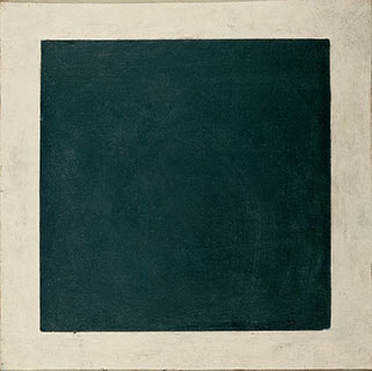|
Malevich, Kazimir. The Black Square. Malevich’s Red Square was ours. But you didn’t care for beautiful things. The Black Square is hardly aesthetic. It is deeply conceptual. I was surprised to happen upon it in an almost empty room one day, walking through the General Staff building. The painting was hung next to a couple of Kandinsky’s works. I knew the Russian Museum had a large collection of his work, but I hadn't realized the Hermitage had a few pieces too. The Russian Museum has many of Malevich’s famous colour paintings: his geometric, faceless peasants, simple fields with red horses running across them, train-like, and the Red Square. I remember the Red Square more than I remember the Black Square. But I like the red one less. The Red Square is like the blander sister: same shape, same size, same two-dimensional surface, but somehow flatter. That wasn’t my first impression of it. The first time I saw that painting was on Valentines Day in 2015 and it felt important. It felt significant that an obscure red shape was what my then-boyfriend and I happened upon as we walked through the galleries. We were holding hands. He was wearing a dark green sweater I’d gotten him for Christmas. I was wearing a three-quarter sleeve grey dress I’d bought that morning. The Red Square was hung towards the end of the gallery. I pulled on his hand to signal a shift in our slow walk-through. We stopped in front of the painting. I took a picture. I didn’t know what it meant, but I pretended to get it. He didn’t know what it meant, and he told me so. It was red, avant-garde, and the picture we photographed on Valentine’s day. That was enough then. But what does it say about a memory, a memory full of sensual, aesthetic, and emotional pleasure, if it is attached to de-aestheticized art? What has always been interesting to me about the Black Square is that at the original exhibit, Malevich famously hung the painting in the corner referred to as the krasniy ugol. In Modern Russian, krasniy means “red,” but the word used to have the connotation of “beautiful.” It was the place in a room in which a Orthodox icon was commonly placed. There is something important for me in the relationship of the two squares, red and black. In hindsight, maybe I should have known that the subconscious association of that painting as a symbol of our love was an eerie foreshadowing. Won't red turn to black, and won't love leave? Did I need to cover myself in the satin of colour to fall into the blackness and know something? To emerge from that blackness and be able to handle the silence? Is that what Malevich did? Silence. I read that white represents the very limit of the expressible, the silence beyond language and blackness beyond the image. So then, is silence the border of emptiness? Is the way to be, the way to keep making sense, to furiously continue going forward to wherever we all seem to be rushing to? And when we come to that end, is the goal simply to be still? Is that what we should do with the black squares in our souls, paint them over with more white? Maybe. Maybe then, at the highest and lowest moments, the only appropriate thing to do is to be quiet. Quiet alone? Quiet with someone? To be quiet and not alone. To listen to the vibration of one’s soul. And maybe when we get that close to the edge of all that we are the only logical next step is to embrace that this is the very edge or to hope that this is the edge of God, not the edge of life. Have I been baptized in black? Have I learned my lessons yet? I don't know, but I will stand still on the edges of silence, looking into the blackness of the square, and continue to fall through nothingness into God. Alisa Goz Originally from St. Petersburg, Russia, Alisa Goz now lives in New York, NY, where she recently graduated from The King's College with a B.A. in Media, Culture, and the Arts.
0 Comments
Your comment will be posted after it is approved.
Leave a Reply. |
The Ekphrastic Review
COOKIES/PRIVACY
This site uses cookies to deliver your best navigation experience this time and next. Continuing here means you consent to cookies. Thank you. Join us on Facebook:
July 2024
|




